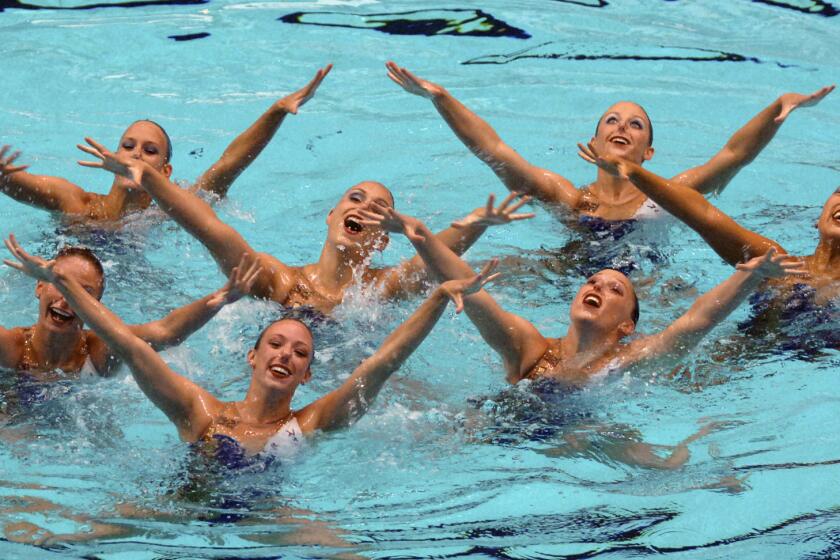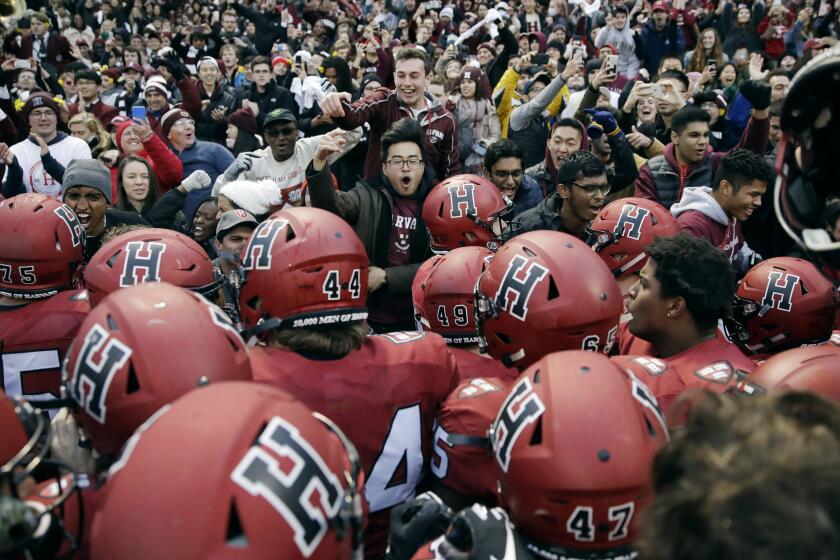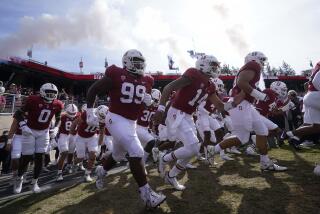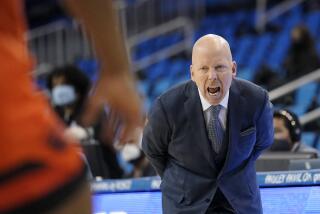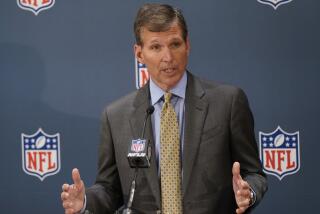College football parents take note of Ivy League suspending fall sports amid pandemic

- Share via
It’s been almost six weeks since Chris and Mya Hinton waded into the growing pool of advocates for college football players. Driven to action by schools deciding to bring athletes back to campuses during the pandemic, the Hintons, who have sons currently playing at Michigan and Stanford, started College Football Parents 247. The group now has 1,400 members.
Hinton, speaking for the larger population of parents in an interview Wednesday, said they have not been rooting against a season. That was never the point. Their goals are for parents to have a seat at the table alongside the schools and NCAA, to have their questions answered as to how it can be done safely.
They felt much worse about that prospect July 1 than June 1, though, with positive case numbers and hospitalizations skyrocketing across the country. And Wednesday, when the Ivy League announced it would not play any sports before Jan. 1, the parents’ unease about what’s being asked of their sons reached a boiling point.
“I don’t know all the financials for an Ivy League football team, but I don’t think they’re raking in the money,” said Hinton, a former NFL first-round pick and seven-time Pro Bowl offensive tackle. “So when you take money out of the equation, it’s a no-brainer. You get the Ivy decision. If the Power Five wasn’t making billions of dollars, they would have shut it down, too.”
On Wednesday, Ohio State and North Carolina became the latest schools to suspend voluntary workouts due to alarming numbers of positive test results. In a statement, Ohio State said the athletes who are infected will self-isolate for 14 days and receive daily check-ups from the school’s medical staff.
Stanford is cutting 11 of its 36 varsity sports programs — including wrestling, field hockey and men’s volleyball — following the 2020-21 school year.
“The health and safety of our student-athletes is always our top priority,” the release finished.
The Ivy League’s decision to cancel its postseason basketball tournament in March started a domino effect that led to all conference tournaments and the NCAA tournament being canceled. And its bold conscience may prove to influence its Division I peers yet again. But to this point, the only thing the big schools have been willing to do in the face of actual mini-outbreaks within their programs is admit that they need to take a little break before pushing further into the unknown.
Wisconsin, without identifying the athletes by sport, announced seven positive cases Wednesday but did not shut down workouts.
“You have the tricked-out car and then you have the car that’s just the basic, factory model … that’s what the Ivy is, it’s the pure form,” Hinton said. “They’re not driven by money. They’re driven by what’s best for the student-athletes. And so to see them make that decision, I think it could potentially expose the other conferences that continue on … that safety is not the No. 1 priority.”
The Hintons love college football. The sport was a huge part of who they were as a family long before Chris and Myles ended up at Michigan and Stanford, respectively. Chris Sr. and Mya met at Northwestern, where he played football and she played basketball. Raising their sons in the Atlanta suburb of Norcross, they built their friendships around college football, and every parent had their allegiance that colored Saturday’s social engagements.
The members of College Football Parents 247 are the last who would want a fall without games.
“Just the idea that for the first time in 10 or 11 years that their son won’t be playing football in the fall [hurts],” Hinton said. “Everybody wants it.”
But they have to think about what’s right for their sons, because they’re not sure that anybody else is, at least among those who have the power.
On Tuesday night, College Football Parents 247 released a list of 22 questions for athletic directors regarding the handling of the coronavirus. Among them: Will conferences enforce uniform requirements for all schools, since the NCAA refuses to do so? What will reporting of positive cases look like and will parents be informed? If local hospitals are at capacity, where will an athlete go for in-patient care? Will the university be providing short-term and long-term insurance coverage?
The Hintons released a letter in early June addressed to athletic directors, university presidents and the NCAA, stating their hope to start a parent advisory committee similar to the NCAA’s athlete advisory group.
“Why is it when it comes to transfer rules, name image and likeness, or eligibility requirements the NCAA can find a ‘size 7’ that every school can comfortably fit but comprehensive safety guidance for Covid-19 is delegated to the individual schools?” the letter asks.
A person with knowledge of the decision says the Ivy League will not play sports this fall because of the coronavirus pandemic.
In the case of his sons, Chris Hinton said he has been pleased with how Michigan and Stanford have handled their return to campus. Still, Wednesday, both schools made national headlines relating to the pandemic.
Michigan coach Jim Harbaugh, speaking in a conference with reporters, had a quote taken out of context on social media that made it seem like he wanted a fall season because he had accepted that “Covid is part of our society.” His larger point was that if students are allowed to be on campus then he trusts the protocols they have in place and welcomes that responsibility to help keep the players safe as a parent of a college-age daughter himself.
Later in the day, Stanford announced it was going to stop supporting 11 varsity sports at the end of the 2020-21 school year due to the financial ramifications of the pandemic.
Every day, Hinton said, it’s something new.
This coming Monday marks the day the NCAA has set for schools to take the next step in workouts, removing some precautions that have been in place during the voluntary portion.
“We’re losing sleep over the idea of Monday coming,” Hinton said, “the idea that now we’re running into the storm versus running away from it.”
More to Read
Go beyond the scoreboard
Get the latest on L.A.'s teams in the daily Sports Report newsletter.
You may occasionally receive promotional content from the Los Angeles Times.

